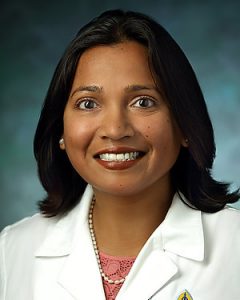Takeaway
In these politically polarizing times, we must continue to practice loving kindness toward our patients. This includes patients who share prejudiced and/or judgmental opinions with us.

Lifelong Learning in Clinical Excellence | June 13, 2022 | 3 min read
By Avani Prabhakar, MBBS, MPH, Johns Hopkins Medicine
“Biden is killing babies. I liked Trump, things were so much better then. There’s no baby formula available. Gas six dollars a gallon, and all Biden wants to do is take our guns away.” As my patient expressed her frustration with politics, I noticed a theme of anger and discontent in many of her clinical experiences.
“I’m getting worse each day I have been in hospital. Where’s the trash can? They can’t do one thing right. Where am I supposed to throw this cup away?” The nurse had just given my patient her medications and was leaving the room as she said this. I moved the trash can closer to the patient and smiled at the nurse.“ I used to have a home care nurse, but she always showed up unannounced, so I told her to go away. Then she put her foot on the door to stop me from closing the door and I told her it was rude.” She was frowning and gesticulating angrily. “And then my friend Brenda, she tells me do this, do that, get therapy, get treatment. I’m 75! I don’t need no one to tell me what to do.”
When patients express their views or judgements vehemently, sometimes we may react with tension and want to share our contrasting opinions. This can prevent a therapeutic alliance from forming and we may miss moments of connection and meaningful information that the patient may share if we just remain present patiently and calmly.
To help me with this, I practice loving awareness with three steps: Pause, Relax, Open.
Pause. Notice any tension arising in your body as you hear expressions of prejudice or judgement.
Relax. Deliberately relax tense areas in your body. Taking an intentional deeper breath may help with this.
Open. Letting go and having a non-striving/being state naturally arises when you let go of your defenses. This can help you to accept however the experience is unfolding and continue to stay engaged in the conversation to allow space for whatever is arising.
“How are you handling all this?” I asked.
“What do you expect? I took Brenda off of my emergency contact list. She can give her sermon elsewhere.”
“It sounds like she was just not the right energy for you,” I said.
“Yes,” the patient responded with a calmer voice. “My daughter wants me to go to rehab, but I want to be home. My home is in Baltimore, and it’s paid off. But there’s a problem with the driveway and I need a good lawyer to sue the city.”
“Do you think you will be fine by yourself at home?” I asked.
“Well, I do agree with my daughter that I’ve gotten weaker. I fell at home, there was no one there and it took a while for them to get me to hospital. So yes, I have some limitations. Do you like spicy food?”
“Sometimes,” I said.
“Well, there is a problem with the kitchen here. Everything has spice. Now I do put a little Old Bay on my shrimp sometimes, but they put spice in everything and I have mouth sores, so I can’t eat it.”
I listened while my patient continued to share her strong views and opinions with sharpness and judgement. Often, we expect patients to give us a calm and polite version of their narrative. That may not be possible for patients who are living with chronic serious illness and/or trauma that we may never learn about.
The difficulty of lived experience in polarizing times means that as clinicians we must continue to practice loving awareness to create space for connection in the midst of anger, discontent, and at times patients’ expressions of prejudice. It’s helpful to remember that patient are not their prejudices or their judgements; rather, they are human beings with rich dimensions of joy, grief, pain, and love.
This piece expresses the views solely of the author. It does not necessarily represent the views of any organization, including Johns Hopkins Medicine.

